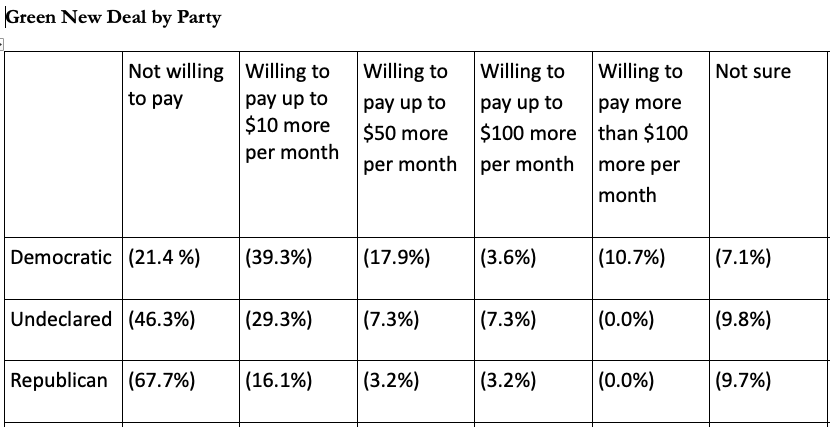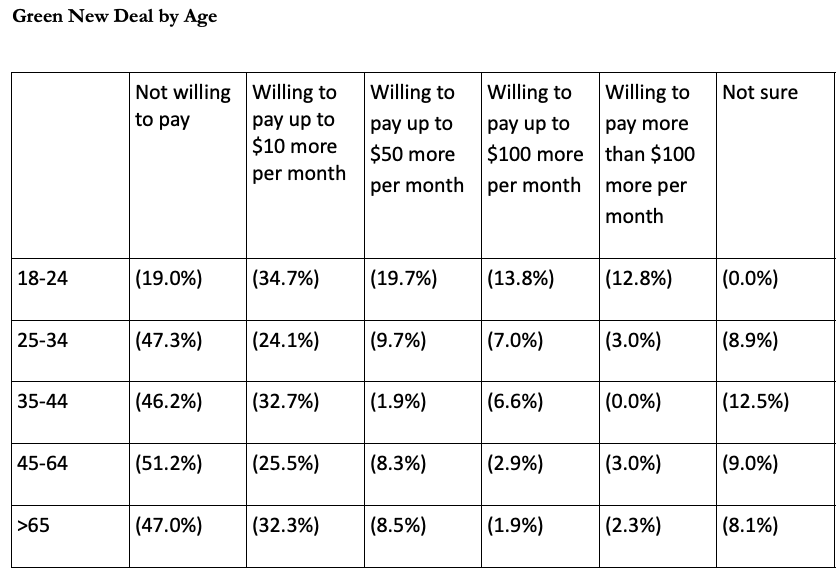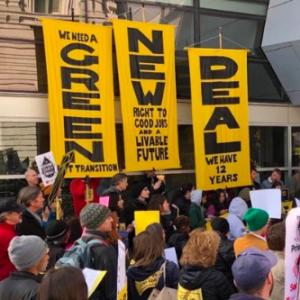Presidential hopefuls get big cheers from New Hampshire crowds when they tout their support for the Green New Deal. But when it comes actually paying for it, Granite Staters have a different message:
Forget it.
An exclusive New Hampshire Journal poll asked local voters how much more per month they are willing to pay in their utility bills “to achieve the goals of the Green New Deal.” The top answer: None.
Nearly half — 46 percent– said they aren’t willing to pay any more on behalf of the highly-publicized climate change initiative. And of those who are, fewer than half are willing to pay any more than just $10 per month.
The Green New Deal is being offered as a plan to address concerns over climate change. How much more per month would you be willing to pay in your heating or electric bill to achieve the goals of the Green New Deal?
You would not be willing to pay any more per month 46.2
You would be willing to pay up to $10 more per month 28.7
You would be willing to pay up to $50 more per month 8.6
You would be willing to pay up to $100 more per month 4.7
You would be willing to pay over $100 more per month 3.3
Not sure 8.5
That $10 figure stands in stark contrast to the expected costs of converting to a carbon-free energy grid, which the most conservative estimates project will cost thousands of dollars per household. Robert Pollin at the University of Massachusetts at Amherst, for example, says the cost would be “manageable” at $600 billion a year for 30 years, which works out to about $4,500 in yearly costs to every American household.
The percentage of Granite Staters willing to pay even $100 or more per month in higher energy bills?
Three percent.
This hasn’t stopped almost all of the top-tier Democratic 2020 presidential candidates from endorsing the Green New Deal, including the six sitting U.S. Senators in the race. All of them are co-sponsors of the Green New Deal resolution — the same resolution just voted down 57-0 on the Senate floor last week.

“Politicians promoting policies that raise [energy] rates think they’ve got the people on their side, but they’re just hearing from a small segment of voters,” Marc Brown of the New England Ratepayers Association told NHJournal. “This poll proves what we’ve been saying all along: They need to think about the ratepayers.”
But Democratic presidential candidates are thinking about primary voters, not ratepayers. And among New Hampshire Democrats, 71.5 percent said they were willing to spend more on behalf of the Green New Deal, though only a third are willing to spend more than $10 per month. And younger voters (18-24), a key demographic in the New Hampshire Democratic primary, are also far more enthusiastic about bearing the costs. More than 80 percent say they’re willing to pay.

And it’s not just in New Hampshire. A November 2018 national survey released by The Associated Press-NORC Center for Public Affairs Research found similar results. In that poll, 43 percent of respondents were unwilling to pay even a single dollar in higher energy costs to fight climate change.
The question is how will that translate in a general election against President Trump?
Not well, apparently. Among Granite State Republicans, 68 percent oppose any increase in their utility bills, as do 46 percent of undeclared voters. And while a mere 10 percent of Democrats are willing to pay $100 or more on the Green New Deal, the percentage among both Republicans and independents is zero.
“The Green New Deal is just a way to energize the Democrat base,” says New Hampshire GOP strategist Mike Dennehy. “These poll numbers illustrate that the Republican base, and pocketbook independents, will get equally as fired up in opposition. You can count on this being a top issue in the 2020 general election – up and down the ballot. Democrats will push Republican candidates on their support of Trump and Republicans will push Democrats on their support of the job-killing Green New Deal.”
The poll of registered voters was conducted by Praecones Analytica between March 26-28 and has a weighted margin of error of +/- 4.86 percent.

